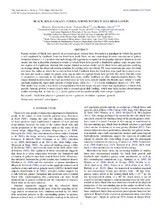Black hole - galaxy correlations without self-regulation
Abstract
Recent models of black hole growth in a cosmological context have forwarded a paradigm in which the growth
is self-regulated by feedback from the black hole itself. Here we use cosmological zoom simulations of galaxy
formation down to z =2 to show that such strong self-regulation is required in the popular spherical Bondi accretion
model, but that a plausible alternative model in which black hole growth is limited by galaxy-scale torques does
not require self-regulation. Instead, this torque-limited accretion model yields black holes and galaxies evolving
on average along the observed scaling relations by relying only on a fixed, 5% mass retention rate onto the black
hole from the radius at which the accretion flow is fed. Feedback from the black hole may (and likely does) occur,
but does not need to couple to galaxy-scale gas in order to regulate black hole growth. We show that this result
is insensitive to variations in the initial black hole mass, stellar feedback, or other implementation details. The
torque-limited model allows for high accretion rates at very early epochs (unlike the Bondi case), which if viable
can help explain the rapid early growth of black holes, while by z ∼ 2 it yields Eddington factors of ∼1%–10%.
This model also yields a less direct correspondence between major merger events and rapid phases of black hole
growth. Instead, growth is more closely tied to cosmological disk feeding, which may help explain observational
studies showing that, at least at z >~ 1, active galaxies do not preferentially show merger signatures.

